七年级英语下册unit11howwasyourschooltrip第1课时sectiona1ac教案人教新目标版101
七年级英语下册人教版unit11_How_was_your_school_trip_Section_A1

see ---saw
Did they pick any strawberries on the farm? Yes, they did. They picked strawberries.
pick ---picked Were the strawberries good? Yes, they were. No, they weren’t.
Peter: Oh, nice. What did you do?
Pairwork
Eric: I went fishing every day. And I fed the chickens with my grandpa. It was so much fun.
Peter: Sounds good .How was the weather there?
climbed the mountains (climb)
took some photos (take)
(is) --How was your last school trip ?
--It was ... (is)
(Are) -- Were you happy on your last school trip?
Did he play soccer yesterday?
3. 实义动词的变化: 实义动词分规则变化和不规则变化。 规则变化有以下几种: (1) 一般情况下在动词后加-ed。 e.g. play—played visit—visited walk—walked clean—cleaned
(2) 以不发音的e结尾的词,在词尾 加-d。 e.g. note—noted like—liked dance—danced name—named
初中英语七年级下册 Unit11How was your school trip
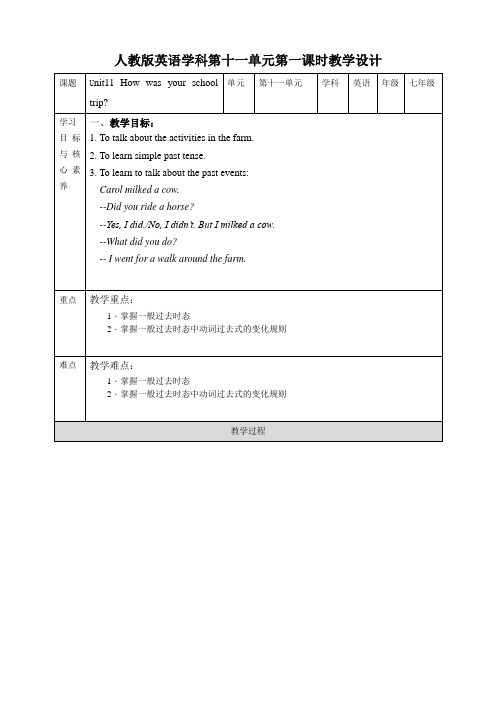
人教版英语学科第十一单元第一课时教学设计课题U nit11 How was your schooltrip?单元第十一单元学科英语年级七年级学习目标与核心素养一、教学目标:1. To talk about the activities in the farm.2. To learn simple past tense.3. To learn to talk about the past events: Carol milked a cow.--Did you ride a horse?--Yes, I did./No, I didn’t. But I milked a cow. --What did you do?-- I went for a walk around the farm.重点教学重点:1.掌握一般过去时态2.掌握一般过去时态中动词过去式的变化规则难点教学难点:1.掌握一般过去时态2.掌握一般过去时态中动词过去式的变化规则教学过程课堂小结Summary1.重点单词:milk,cow,horse,feed,farmer,quite2.重点短语:go for a walk, milk a cow, ride a horse, feed chickens, talk witha farmer, take some photos, quite a lot3.重点句式:—Did you see any cows?—Yes, I did. I saw quite a lot.—Did you ride a horse?—No, I didn't. But I milked a cow.板书go for a walk, milk a cow, ride a horse, feed chickens, talk with a farmer, take some photos, quite a lot。
2019-2020年人教版英语七年级下册Unit 11 How was your school tr
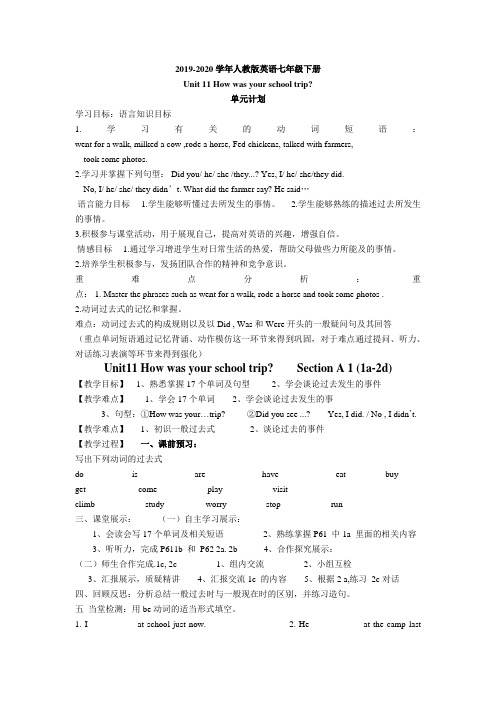
2019-2020学年人教版英语七年级下册Unit 11 How was your school trip?单元计划学习目标:语言知识目标1.学习有关的动词短语:went for a walk, milked a cow ,rode a horse, Fed chickens, talked with farmers,took some photos.2.学习并掌握下列句型: Did you/ he/ she /they...? Yes, I/ he/ she/they did.No, I/ he/ she/ they didn’t. What did the farmer say? He said…语言能力目标 1.学生能够听懂过去所发生的事情。
2.学生能够熟练的描述过去所发生的事情。
3.积极参与课堂活动,用于展现自己,提高对英语的兴趣,增强自信。
情感目标 1.通过学习增进学生对日常生活的热爱,帮助父母做些力所能及的事情。
2.培养学生积极参与,发扬团队合作的精神和竞争意识。
重难点分析:重点: 1. Master the phrases such as went for a walk, rode a horse and took some photos .2.动词过去式的记忆和掌握。
难点:动词过去式的构成规则以及以Did , Was 和 Were 开头的一般疑问句及其回答(重点单词短语通过记忆背诵、动作模仿这一环节来得到巩固,对于难点通过提问、听力、对话练习表演等环节来得到强化)Unit11 How was your school trip? Section A 1 (1a-2d)【教学目标】1、熟悉掌握17个单词及句型2、学会谈论过去发生的事件【教学难点】1、学会17个单词2、学会谈论过去发生的事3、句型:①How was your…trip? ②Did you see ...? Yes, I did. / No , I didn’t. 【教学难点】1、初识一般过去式2、谈论过去的事件【教学过程】一、课前预习:写出下列动词的过去式do______ is_______ are_______ have_______ eat____ buy_____ get______ come ______ play _____ visit______climb ______ study _____ worry_____ stop _____ run_____三、课堂展示:(一)自主学习展示:1、会读会写17个单词及相关短语2、熟练掌握P61 中1a 里面的相关内容3、听听力,完成P611b 和P62 2a. 2b4、合作探究展示:(二)师生合作完成.1c, 2c 1、组内交流2、小组互检3、汇报展示,质疑精讲4、汇报交流1c 的内容5、根据2 a,练习2c对话四、回顾反思:分析总结一般过去时与一般现在时的区别,并练习造句。
人教七下Unit 11 How was your school trip?知识点

Unit 11 How was your school trip?Section A1. How was your trip yesterday?(1)本句为询问某事情况的常用句型,其中was是be动词的过去式,如果询问当前的情况则be动词用is。
其答语常用:It was great! (好极了) / It was OK.(还可以)/ It wasn’t good.(不好。
)/ All right.(很好。
)/ It was not bad.(还不错。
)等。
How + be+…?相当于What + be +… + like? 例如:-How was her holiday?-It was not bad.(2)How是疑问副词,意为“如何,怎样”,常用来引导特殊疑问句来询问方式、程度、状况等。
常用于以下交际用语中:1)How is/are +sb. ? 用来询问人的身体、工作、学习或生活等的状况。
例如:-How are you? -Fine, thank you.2)How is/are +sth.?用来询问某物或者某事的状况如何。
例如:How is your work?3)How do you do? 并不表示疑问,是第一次见面时的问候语,回答仍用此句。
例如:How do you do? ---How do you do?4)How is it going?/ How is everything going? 用来询问事情进展如何。
例如:How is it going? Very well./ Not too bad./just so so.2. feed chickenfeed 作及物动词,意为“喂养,饲养”,其后常接表示动物名称的词作宾语。
例如:My father’s job is to feed the animals.拓展:(1)feed..to…意为“把……喂给……吃”。
feed后接饲料或者食物名称做宾语,to为介词,其后一般接动物或者小孩等名词表示对象。
七年级下册英语unit 11 Section A第1课时(1a~2d)

第11单元How was your school trip?
【课时建议】 本单元建议5课时
Section A (1a~2d ) (1)
Section A (3a ~3b ) (1)
Section B (1a ~1d ) (1)
Section B (2a~2c ) (1)
Section B (3a ~3c )……………………………………………………………………………………1课时
词汇短语:主要采用图片及多媒体展示助记法。
基本句子:采用多媒体展示及交际法。
语法:般过去时态——采用歌诀助记法。
规则动词的过去式构成方法
过去式构成有规律,一般词尾加-ed 。
词尾有个e ,去e 再加上-ed 。
辅音字母加y,变y 为i 加-ed 。
一辅重闭作尾巴,双写之后加-ed 。
Section A 第1课时(1a~2d
)
布置作业:教师引导学生课后完成本课时对应练习,并预习下一课时内容。
教学说明:
以上周的郊游为话题,引出一般过去时态,简洁明了,直奔主题。
教学说明:
通过听、说、读、写学习训练让学生掌握语言目标——一般过去时态,同时学生的口语表达能力在这一环节得到提升。
新人教版七年级英语下册Unit 11 How was your school trip Sectio

1b. Listen and answer the questions.
4.How to ……疑问句+不定式? They want to know how to make a model plane? 他们想知道如何制作飞机模型?(报纸) 5.take photos=take pictures照相 take a photo /photos of sb 给某人拍照 6.buy——过去式:bought 买 buy sb sth =buy sth for sb 给某人买某物 buy some lovely gift for my parents。 点睛:p74 7. lovely 形容词:可爱的 报纸:Helen has a lovely dog and she likes it very much。 Helen 有一个可爱的狗狗,她非常喜欢它。
2.It is +adj+to do sth 做某事很怎么样。 3.any 用于否定句,此句有didn’t)
(7)There were also too many people and I couldn’t really see or hear the guide. (人也太多而且我也不能看见或听见向导说的 话。)
expensive
3a. Look at the pictures of Bob’s school trip. Complete his diary entry.
Unit11-How-was-your-school-trip1

Unit11 How was your school trip?Section A 1 (1a-2d)【教学目标】1、熟悉掌握17个单词及句型2、学会谈论过去发生的事件【教学难点】1、学会17个单词2、学会谈论过去发生的事3、句型:①How was your…trip?②Did you see ...?Yes, I did. / No , I didn’t.【教学难点】1、初识一般过去式2、谈论过去的事件【教学过程】Step 1 : Warming –up1 GreetingWho is on duty today ?Who was on duty yesterday ?What is the weather like today ?What was the weather like yesterday ?2 Song : Play the song “ Old MacDonald had a farm” and have Ss find out the animals in the songGet Ss answer like this : On the farm ,there are some ducks, cats,chickens, cows pigs,dogs and horses . They are animals.Step 2 : Presentation1 Show a picture and tell Ss: This is also a farm. Last week Carol and hisclassmates had a school trip. They went to the farm. What did they do on the farm? How was their school trip?2 Show some pictures again and try to get the past tense verbs expressions according to the pictures.(1) Show the picture and the question(2) Ask one student to answer the question.(3) All students read it toghter.Q:Did he ride a horse?A:Yes, he did. He rode a horse.Q:Did he milk a cow?A:Yes, he did. He milked a cow.Q:Did he ride a horse?A :No, he didn’t .Did he feed chickens?Yes, he did. He fed chickens.Did you go to the zoo?No, I didn’t. I went to a farm.Did you see any cows ?Yes, I did. I saw quite a lot.Did they pick any strawberries on the farm ?Yes, they did .How were the strawberries?They were delicious.Were the strawberries good?Yes, they were.No, they weren’t.How was your school trip ?It was great.Were the strawberries good ?Yes ,they were.No, they weren’t.Step 3 ExercisesStep 4 : Practice (Listening and speaking)1a Match the phrses with the pictures.1b Listen and circle the three things Carol did on her school trip in 1a.1c Ask and answer questions about Carol’s school trip.2a Listen and check the questions you hear.2b Listen again.Circle T for true or F for false2c Ask and answer quest ions about Carol’s visit to the farm.Step 5 :Tasks:1 Look at the pictures and practice the dialogueA:How was your school trip?B: It was …(boring/interesting/good/great…)A:What did you do on the school trip ?B:I went for a walk with my classmates.2 2d Role-play the conversation3.Groupwork: Make a survey. Ask your partners what they didlast week. Then give a reporter.Step 6 : Grammar Focus ( Get Ss read aloud )How was your school trip ? It was great !Did you go to the zoo ? N o, I didn’t. I went to a farm.Did you see any cows ? Yes, I did. I saw quite a lot.Did Carol ride a horse ? No, she didn’t. But she milked a cow.Were the strawberries good ? Yes, they were . No, they weren’t. Step 6 Summary and Language pointsStep 7 Exercises :用be动词的适当形式填空。
七年级英语下册Unit 11 How was your school trip SectionA Period 1(1a-2c)

1. ____ Did he see any cows on the farm? Yes, he did. 2. Did he milk a cow on the farm? No, he ______. didn’t 3. Were the strawberries good? Yes, they were 4. Did you see any cows? Yes, I did. I saw ___ quite a lot. 5. I ___ fed the chickens last week.
1a Match the phrases with the pictures. went for a walk e milked a cow b rode a horse a fed chickens c talked with a farmer f took some photos d
1b Listen and circle the three things Carol did on her school trip in 1a.
Learning aims:
• learn new words & phrases: • new sentences: (1)--- How was your school trip? --- It was great. (2)学会用 Did you ...? Yes,I did./ No,I didn't. 描述过去的事情。 Practice listening & speaking skills.
went for a walk milked a cow rode a horse fed chickens talked with a farmer took some photos
贵州省习水县七年级英语下册Unit11Howwasyourschooltrip(第1课时)Secti
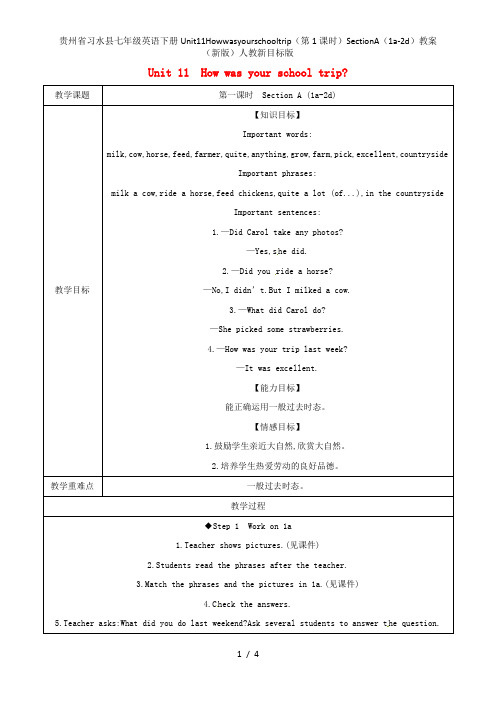
Unit 11 How was your school trip? 教学课题第一课时Section A (1a-2d)教学目标【知识目标】Important words:milk,cow,horse,feed,farmer,quite,anything,grow,farm,pick,excellent,countrysideImportant phrases:milk a cow,ride a horse,feed chickens,quite a lot (of...),in the countrysideImportant sentences:1.—Did Carol take any photos?—Yes,s he did.2.—Did you ride a horse?—No,I didn’t.But I milked a cow.3.—What did Carol do?—She picked some strawberries.4.—How was your trip last week?—It was excellent.【能力目标】能正确运用一般过去时态。
【情感目标】1.鼓励学生亲近大自然,欣赏大自然。
2.培养学生热爱劳动的良好品德。
教学重难点一般过去时态。
教学过程◆Step 1 Work on 1a1.Teacher shows pictures.(见课件)2.Students read the phrases after the teacher.3.Match the phrases and the pictures in 1a.(见课件)4.C heck the answers.5.Teacher asks:What did you do last weekend?Ask several students to answer t he question.6.Ask students to ask and answer in pairs.◆Step 2 Listening1.Listen and circle the three things Carol did on her school trip in 1a.2.Check the answers.(见课件)◆Step 3 Work on 1cAsk students to ask and answer questions about Carol’s school trip in pairs.A:Did Carol take any photos?B:Yes,she did.◆Step 4 Listening1.Ask students to listen and check(√) the questions they hear in 2a.2.Listen again and circle T for true or F for false for the sentences in 2b.3.Check the answers.(见课件)◆Step 5 Work on 2cLet students ask and answer questions about Carol’s visit to the farm in pairs.教学过程A:What did Carol do?B:She picked some strawberries.◆Step 6 Role-play1.Ask students to read the conversation and answer the questions.(见课件)(1)Where did Eric go last week?(2)What did Carol do?(3)How was the weather?2.Ask several students to answer the questions.3.Ask students to role-play the conversation in 2d in pairs i n front of the class.◆Step 7 HomeworkLearn the conversation in 2d by heart.板书设计Section A (1a-2d)重点短语k a cow2.ride a horse3.feed chickens4.quite a lot (of...)5.in the countryside重点句型1.—Did Carol take any photos?—Yes,she did.2.—Did you ride a horse?—No,I didn’t.But I milked a cow.3.—What did Carol do?—She picked some strawberries.4.—How was y our trip last week?—It was excellent.课堂练习Ⅰ.根据汉语意思完成句子1.——你看见过奶牛吗?——是的。
人教版七年级下册英语Unit 11 SectionA (1a-2d)

e.g. It’squite/verynecessarytostopschoolbullying. 阻止校园欺凌很有必要。 MybrotherthinksWangFengsingsquite/verywell. 我哥哥认为汪峰唱得非常好。 Shequitelikesswimming. 她非常喜欢游泳。 Tomisaverygoodboy. =Tomisquiteagoodboy. 汤姆是个很好的男孩。
We grow flowers in our
及物动词,“种植;
garden.
栽培”,过去式是 我们在我们的花园里
grew。
种花。
In spring, everything
gro
begins to grow. 在春天,
w
万物开始生长。
典例 —Whydoyouwanthimtojoinus? —Becauseheis________. B A. goodaquiteplayerB. quiteagoodplayer C. aquitegoodplayerD. quitegoodaplayer
【点拨】本题考查quite的用法。quite同形容词连用修饰名 词时,放在不定冠词之前。quiteagoodplayer意为“一位 相当好的运动员”。
2b
Listenagain.CircleTfortrueorFforfalse.
1.ThefarmershowedCarolaroundthefarm. T F6 2.Carollearnedalotaboutfarming. T F 3.Thefarmersgrowstrawberriesfrom DecembertoJune. T F 4.Thefarmersdon'tgrowapples.T F 5.Carolpicked❼somestrawberries andtookthemhome. T F
人教版pep英语七年级下册-Unit-11-单元分析

比分析能力。
品店的东西很贵。
分课时教学目标
课时 period 1
period 2
Period 3 Period 4
Period 5
分课时教学目标
学生能够: 1.了解卡罗尔在旅行中做了什么的详细信息,并复述卡罗尔的 旅行经历; 2.正确使用目标语言进行关于旅行的对话。
1.获得埃里克、简和托尼旅行的详细信息; 2.用目标语言复述和谈论这些旅行; 3.从更多方面分享我们自己的旅行,并思考我们可以从旅行中 得到什么。
作业设计 根据农场旅行vlog编写对话(学习理解+应 用实践) 描述自己的一段令人难忘的旅行经历(应 用实践+迁移创新)
利用静态雕像进行故事接龙(应用实践+迁 移创新)
按要求编写和Jim的对话(应用实践+迁移 创新)
写一篇旅行日记(应用实践)
教学内容 语篇类型
Period 4
2b两篇日记 (应用文)
What
Why
How
Helen和Jim的日记,记录了 2b两篇日记是两个人 因为是日记体裁,所以这两
对待同一场学校旅行两人不 对同一场学校旅行截 个语篇均使用第一人称和一
同的感受和评价。
然不同的记录与感受。 般过去时按照旅行发展的顺
Helen认为参观科学博物馆 启发学生对于看待事 序去展开描述,Helen与Jim
行很糟糕,觉得火车很慢车 写作。
lovely, exciting,
厢里面很热,博物馆大且无
terrible, hot, boring等
趣,因为他对机器人不感兴
形成的对比,这不仅考查了
趣。馆内很暗所以他没拍照。
学生对篇章的理解,培养了
而且人很多,他看不清也听
人教版新目标七年级下Unit11 How was your school trip Section a1课件

play computer
played computer
What did you/he/she/they/Mr. Green do last weekend?
studied for the test
watched TV
did some reading
had a party
played tennis
3. 情态动词的一般过去时态 肯定句式:主语 + 情态动词的过去式 +v原型+ 其它. 否定句式:主语 + 情态动词的过去式 + not +v原型 + 其它. 一般疑问句:情态动词的过去式 + 主语 + v原型+ 其它? could , may→______, might 注:情态动词的过去式:can→_____ would ,shall-______ must ,will-______ should must→_____ 。 4.特殊疑问句式:特殊疑问词+ 一般疑问句? 1)特殊疑问词+was/were+主语+其他? 2)特殊疑问词+情态助动词过去式+主语+v.原形+其他? 3)特殊疑问词+did+主语+v.原形+其他? 1)Why ____ was ____he late for school last Monday? 他上周一为什么上学迟到了? do 2)What _____ could ______she ____twenty years ago? 20年前她能做什么? Where did go yesterday?昨天你去哪了? 3) _____ _____you_d time yesterday. 1. They ______ watch (not watch) TV last night. 2. They didn’t ___________ Did you _____ go (go) to the park yesterday? 3. ____ did / _____, No I didn’t. Yes, I____. 注意:1. did和didn’t 是构成一般过去时的助动词, 其特点是要在其后跟动词的原形。 2. 实意动词do的一般过去时 I do my homework every day.(用yesterday改写句子) did I ____my homework yesterday. didn’t do my homework yesterday.(否定句) I _________ do your homework yesterday? ____ you ____ Did Yes ,I did. /No, I didn’t.(一般疑问句)
2019版七年级英语下册 Unit 11 How was your school trip教案 (新版)人教新目标版

课 题
Unit 11How was your school trip?
课时
第一课时Section A(1a-2d)
课型
New
教学目标
知识
目标
1.学习并掌握下列词汇:
milk, cow, horse, feed, farmer, quite, anything, grow, farm, pick, excellent, countryside
8.许多的
Ⅲ.单项选择
(B)1. —_______
—It was pretty good.
A. How did you do it?
B. How was your trip?
C. What did you do?
D. Where did you go?
(B)2. —_______you buy a new book yesterday?
通过小组活动,增强学生学习积极性,培养学生团队协作精神。
续表
教学环节
教师活动
学生活动
备课札记
Step 7
Summarize
1. Guide the students to summarize the new words, short phrases and sentences in this class.
2. Ss ask and answer questions in pairs.
通过利用相关信息差进行口语结对活动,在交流信息过程中,进行真实的交际问答活动。
Step 5
Role-Play (2d)
1. Let Ss learn about the background of the conversation.
人教版七年级英语下册Unit11Howwasyourschooltrip教案设计

⼈教版七年级英语下册Unit11Howwasyourschooltrip教案设计UNIT11 How was your school trip?Section A 第1课时(1a?1c)⾃主学习⽅案1.⾃学⽣词,并记住拼读及拼写。
2.预习课本找出重点短语及句⼦。
(见学案⾃学导练内容)3.读记后完成⾃学导练内容。
课堂导学⽅案Step1 情景导⼊Teacher:We had a school trip last week. Did you have a good time? How was your school trip?Students : Not bad/Pretty good/Great/Terrible.Teacher :Did you take any photos?Did you feed chickens?What did you do? Please tell us what you did. Do you want to know what Carol did?环节说明:以上周的校游为话题,引出⼀般过去时态,简洁明了,直奔主题。
Step 2完成教材1a-1c的任务1.认真观察图⽚,将图⽚和la中所给的短语匹配。
集体核对答案,完成la。
(2分钟)2.教师领读la中的词组,学⽣跟读并且识记,然后两⼈⼀组互相提问。
以⼩组为单位总结动词过去式的构成规则,教师补充点拨。
(5分钟)3.⼤声朗读图⽚中的⼩对话,提前感知听⼒内容。
(2分钟)4.认真听录⾳,圈出Carol在校游时所做的事情,集体核对答案,完成lb的听⼒任务。
(3分钟)5.练习lc中的对话,并请学⽣表演。
(2分钟)6.模仿lc中的对话,利⽤la中的图⽚信息,两⼈⼀组来谈论Carol在校游时所做的事情,邀请⼏组学⽣来表演对话。
(4分钟)参考案例:A:Did Carol take any photos?B:Yes,she did. /No,she didn’t.7.⼩结训练。
七年级英语下册Unit11Howwasyourschooltrip说课稿1新版人教新目标版
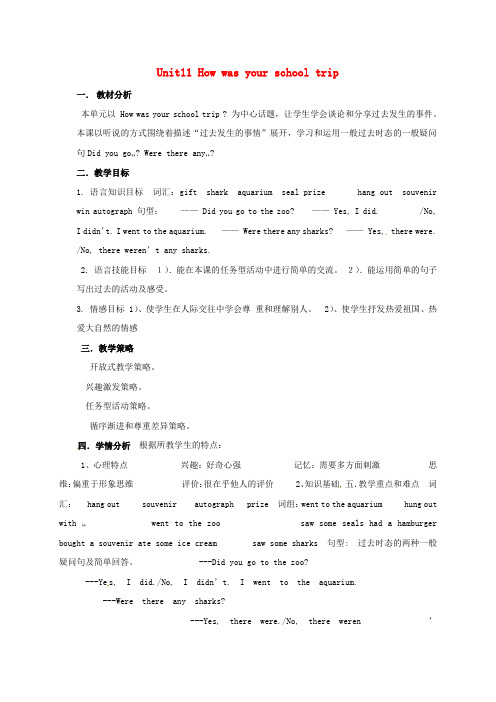
Unit11 How was your school trip一.教材分析本单元以 How was your school trip ? 为中心话题,让学生学会谈论和分享过去发生的事件。
本课以听说的方式围绕着描述“过去发生的事情”展开,学习和运用一般过去时态的一般疑问句Did you go…? Were there any…?二.教学目标1. 语言知识目标词汇:gift shark aquarium seal prize hang out souvenirwin autograph 句型:—— Did you go to the zoo? —— Yes, I did. /No,I didn’t. I went to the aquarium. —— Were there any sharks? —— Yes, there were./No, there weren’t any sharks.2. 语言技能目标1).能在本课的任务型活动中进行简单的交流。
2).能运用简单的句子写出过去的活动及感受。
3. 情感目标 1)、使学生在人际交往中学会尊重和理解别人。
2)、使学生抒发热爱祖国、热爱大自然的情感三.教学策略开放式教学策略。
兴趣激发策略。
任务型活动策略。
循序渐进和尊重差异策略。
四.学情分析根据所教学生的特点:1、心理特点兴趣:好奇心强记忆:需要多方面刺激思维:偏重于形象思维评价:很在乎他人的评价 2、知识基础五.教学重点和难点词汇: hang out souvenir autograph prize 词组:went to the aquarium hung outwith … went to the zoo saw some seals had a hamburger bought a souvenir ate some ice cream saw some sharks 句型: 过去时态的两种一般疑问句及简单回答。
人教版七年级英语下册教案Unit 11 How was your school trip第一课时

Unit 11How was your school trip?单元目标第一课时Section A (1a-2d) 课时目标show sb. around 带领某人参观learn about 了解,学习grow strawberries 种草莓from...to... 从……到……(时间/地点) pick strawberries 摘草莓in the countryside 在乡下;在农村go fishing 去钓鱼so much fun 非常有趣,很开心at night 在夜里,在晚上重点句子1.—Did you see any cows? 你看见奶牛了吗?—Yes, I did. I saw quite a lot. 是的,我看见了。
我看到了很多头奶牛。
2.—Did you ride a horse? 你骑过马吗?—No, I didn't. But I milked a cow. 不,我没有。
但是我给奶牛挤了奶。
重点句子3.The farmer showed Carol around the farm.这位农场主带着卡罗尔参观了农场。
4.The farmers grow strawberries from December to June. 农民从十二月到六月种植草莓。
5.Carol picked some strawberries and took them home. 卡罗尔采摘了一些草莓并带回了家。
6.—How was your trip? 你的旅行怎么样?—It was excellent. 非常棒。
7.—What did you do? 你做了什么?—I went fishing every day. 我每天都去钓鱼。
8.It was so much fun. 那真是太好玩了。
教学难点让学生初步了解一般过去时的用法,并学会谈论过去的事情;掌握一些关于农场的动词短语自主学习根据句意及音标提示写出单词及其汉语意思。
Unit 11 How was your school trip(讲义及答案)
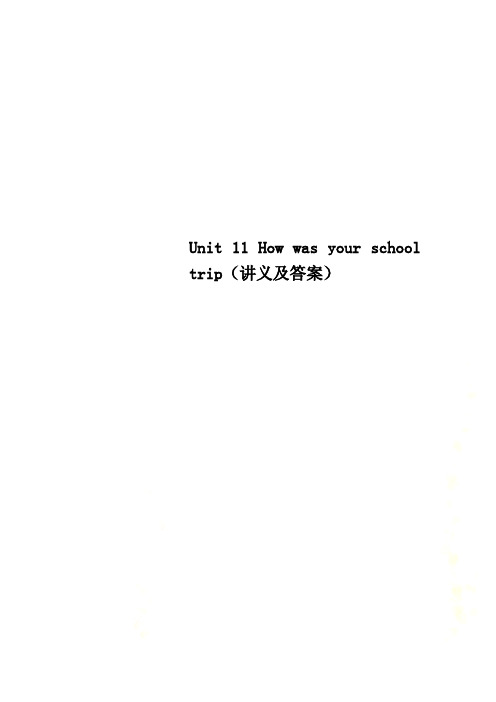
Unit 11 How was your school trip(讲义及答案)Unit 11 How was your school trip?(讲义)Part 1 Words and Expressionsmilk /mɪlk/ v. 挤奶cow /kaʊ/ n. 奶牛milk a cow 挤奶horse /hɔː(r)s/ n. 马ride a horse 骑马feed /fiːd/ v.(fed /fed/)喂养;饲养feed chickens 喂鸡farmer /'fɑː(r)mə(r)/n. 农民;农场主quite /kwaɪt/ adv. 相当;完全quite a lot (of…) 许多anything /'enɪθɪŋ/pron.(常用语否定句或疑问句)任何东西;任何事物grow /grəʊ/ v. (grew/ɡruː/)种植;生长;发育farm /fɑː(r)m/ n. 农场v. 务农;种田pick /pɪk/ v. 采;摘excellent /'eksələnt/adj. 极好的;优秀的countryside /'kʌntrisaɪd / n. 乡村;农村in the countryside 在乡下;在农村yesterday /'jestə(r)di/adv. 昨天flower /'flaʊə(r)/n. 花worry /'wʌrɪ/ v. & n. 担心;担忧luckily /'lʌkɪli/ adv. 幸运地;好运地sun /sʌn/ n. 太阳museum /mjuː'ziəm/n. 博物馆fire /'faɪə(r)/n. 火;火灾fire station 消防站painting /'peɪntɪŋ/n. 油画;绘画exciting /ɪk'saɪtɪŋ/adj. 使人兴奋的;令人激动的lovely /'lʌvli/ adj. 可爱的expensive /ɪk'spensɪv/ adj. 昂贵的cheap /tʃiːp/ adj. 便宜的;廉价的slow /sləʊ/ adj. 缓慢的;迟缓的fast /fɑːst/ adj. & adv. 快地(的)slow & fastadj. 缓慢的;迟缓的adj.& adv. 快地(的)adj.a slow driver a fast walkerI missed the fast train and had to get the slow one.adv.slowly & fastCan you speak slowly? The boy runsfast.interesting adj. 感兴趣的be interested in 对……感兴趣I am interested in music and my brother is interested in sports. We had a great time on the farm yesterday. We were interested in milking the cow.be interested in 主语通常是人,接动词时用动词的-ing 形式。
How was your school trip 教案

Unit 11 How was your school trip?一、教学目标:1. 语言知识目标;基本词汇:milk, cow, horse, feed, farmer, quite, anything, grow, farm, pick, excellent, countryside, yesterday, flower, worry, luckily, sun, museum, fire, painting, exciting, lovely, expensive, cheap, slow, fast, robot, guide, gift, everything, interested, dark, hear基本词组:milk a cow, ride a horse, feed chickens, quite a lot (of…), in the countryside, fire station, all in all, be interested in基本句型:How was your school trip? It was great !Did you go to the zoo? No, I didn’t. I went to a farm.Did you see any cows? Yes, I did. I saw quite a lot.Did Carol ride a horse? No, she didn’t. But she milked a cow.We re the strawberries good? Yes, they were. No, they weren’t.2. 技能目标:能运用一般过去时描写过去的事情3. 情感目标:学会客观地表达对事物的看法,培养乐观向上的性格二、教学重难点:1. 教学重点:一般过去时的判断及选用2. 教学难点:正确运用一般过去时三、教学课时:四课时第一课时:Section A 1a–2c第二课时:Section A 2d–3b第三课时:Section B 1a-2c第四课时:Section B 3a-Self check四、教学步骤第一课时:Section A 1a–2cTeaching aims (教学目标)1. 主要是学习一般过去时的定义,能用一般过去时描述过去发生的事情,学会使用一般过去时的陈述句,及一般疑问句和答语。
- 1、下载文档前请自行甄别文档内容的完整性,平台不提供额外的编辑、内容补充、找答案等附加服务。
- 2、"仅部分预览"的文档,不可在线预览部分如存在完整性等问题,可反馈申请退款(可完整预览的文档不适用该条件!)。
- 3、如文档侵犯您的权益,请联系客服反馈,我们会尽快为您处理(人工客服工作时间:9:00-18:30)。
4.Role-playtheconversation.
Bob:Hi,Carol.Howwasyourschooltripyesterday?
Carol:Itwasgreat!
Bob:____yougotothezoo?
4.Role- play the conversation in 2d.
1.Readtheconversationin2dandanswerthequestions.
A:WhatdidCaroldo?B:Shepickedsomestrawberries.
A:Wasthefarmerfriendly?B:…
A:WhatdidCarolsee?B:…
A:Dotheygrowapples?B:
A:Whendotheyp ickapples?B:…
A:WhatdidCarolpickonthefarm?Applesorstrawberries?Weretheydelicious? B:…
Didyouseeanycows?Yes,Idid.Isawquitealot.
DidCarolrideahorse?No,shedidn’t.Butshemilkedacow.
Werethestrawberriesgood? Yes,theywere.No,theyweren’t.
2.技能目标:能运用一般过去时描写过去的事情
How was your school trip
课题
Unit 11 How was your school trip?
第一课时Section A (1a2c)
课型
新授课
教学目标
1.语言知目标:
基本词汇:milk,cow,horse,feed,farmer,quite,anything,grow,farm,pick,
3.情感目标:学会客观地表达对事物的看法,培养乐观向上的性格
重点
一般过去时的判断及选用
难点
正确运用一般过去时
教学用具
录音机,多媒体
教学环节
说明
二次备课
复习
新课导入
Step1Warmingup
Showsomepictur esandtalkaboutthepresenteventsandpastevents.
5.Workon1c.
AskandanswerquestionsaboutCarol’sschooltrip.
A:DidCaroltakeanyphotos?B:Yes,shedid.
A:DidCarolrideahorse?B:…
A:DidCaroltalkwiththefarmer?B:…
Step4Practice
WheredidCarolgoonherschooltrip?DidCarolseeanychickens?
3.Workon1b.
ListenandcirclethethreethingsCaroldidonherschooltripin1a.
wentforawalkmilkedacowrodeahorse
Carol:No,Ididn’t.Iwenttoa_____.Look,herearemyphotos.
Bob: Didyouseeany_____?
Carol:Yes,Idid.Isaw_________.
Bob:____yourideahorse?
Carol:No,Ididn’t.ButI______acow.
1.Workon1a.
Matchthephraseswiththepictures.
wentforawalkmilkedacowrodeahorse
fedchickenstalkedwithafarmertooksomepho tos
2.Listentothetapeandanswerthequestion.
excellent,countryside,
基本词组:
milkacow,rideahorse,feedchickens,inthecountryside, quite a lot
基本句型:Howwasyourschooltrip?Itwasgreat!
Didyougotothezoo?No,Ididn’t.Iwenttoafarm.
Bob:Didyoufeedanychickens?
Carol:Well,I____somechickensbutI______feedthem.
Bob:What____didyoudo?
Carol:MyfriendsandI___forawalkaroundthefarmand____withafarmer.
2.Showsomepicturesagainandtrytogetthepasttenseverbsexpressionsaccordingtothepictures.
rodeahorse/milkedacow/fedchickens/talkedwithfarmers…
Step3Listeningandspeaking
something作不定代词,也可意为“某事;某东西”,常用在肯定句中。
2.Workon2b.Listenagain.CircleTfortrueorFforfalse.
Check the answer.
3.Workon2c.AskandanswerquestionsaboutCarol’svi sittothefarm.
1.Workon2a.Liste nandcheckthequestionsyouhear.
注意:
1)Dotheygrowapples?
农民是否通常种植苹果,属于经常性的情况。其他问句都是问发生在过去的农场之行的所见所闻。
2)anything作不定代词,可意为“某事;某东西”,常用在疑问句或否定句中。
1.Whatd o eshe/sheoftendoonweekends?
2.Whatdidyoudolastweekend?
课程讲授
Step2Presentation
1.ShowapictureandtellSs:
YesterdayCarolandhisclassmateswenttothefarm.Whatdidt heydoonthefarm?
